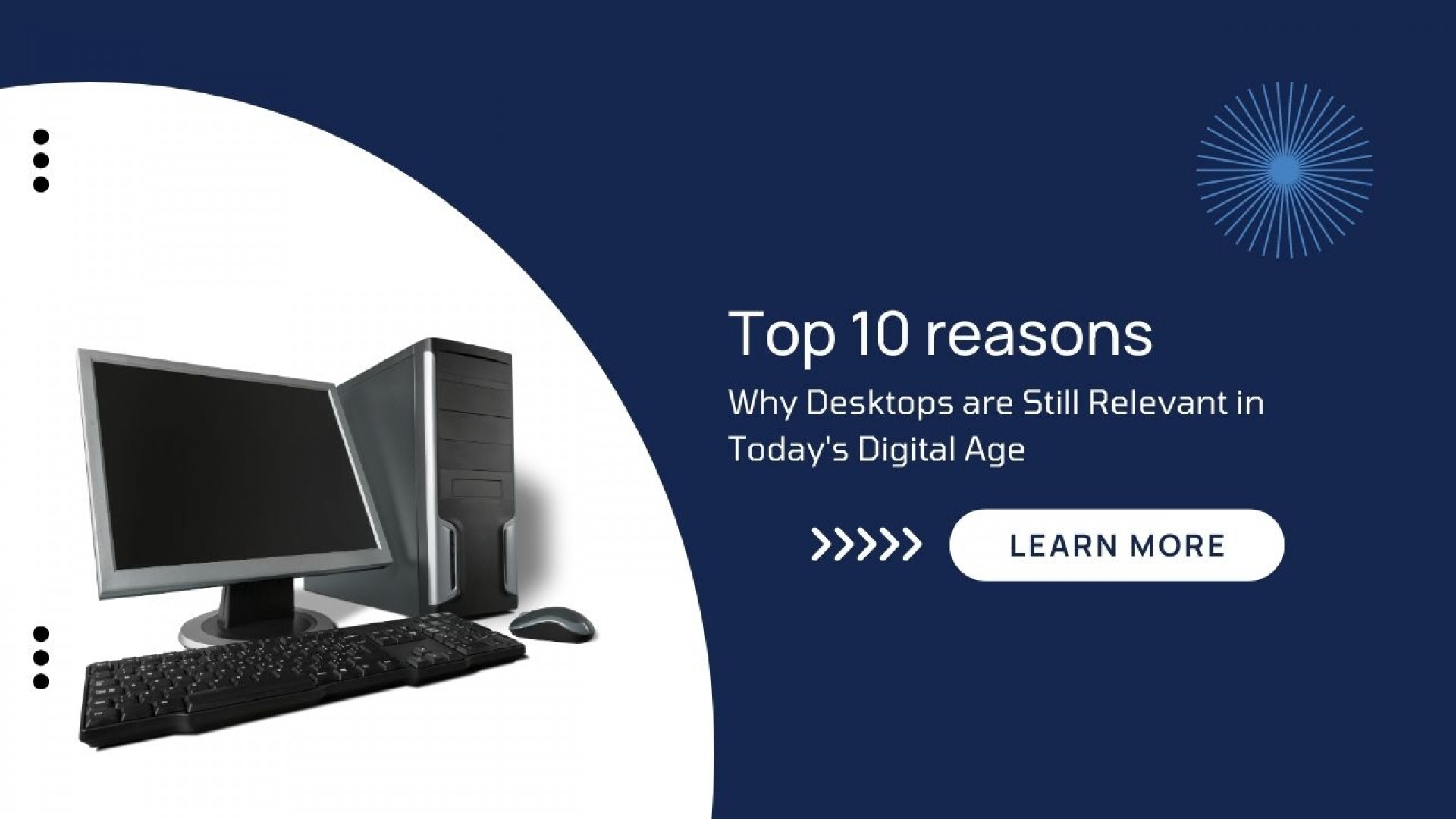
Top 10 reasons why desktops are still relevant:
Performance:
Desktop computers are generally more powerful than laptops or mobile devices. They can handle more demanding applications and tasks, making them ideal for tasks such as video editing, gaming, and running multiple programs simultaneously. If you need a computer for work that requires high performance, a desktop computer is a better option than a laptop.
Customization:
Desktop computers offer more customization options than laptops or mobile devices. You can easily upgrade the hardware components such as the graphics card, processor, and RAM to improve performance. You can also customize the peripherals such as the keyboard, mouse, and monitor to suit your preferences. This level of customization is not possible with laptops or mobile devices.
Ergonomics:
Desktop computers are designed to be used with a separate keyboard, mouse, and monitor. This setup is more ergonomic than using a laptop or mobile device for extended periods. With a desktop computer, you can adjust the height of the monitor and use a separate keyboard and mouse to reduce strain on your neck, shoulders, and wrists.
Cost:
Desktop computers are generally more affordable than laptops or mobile devices with similar specifications. This is because desktop computers are easier to manufacture and there is more competition in the market. If you're on a tight budget, a desktop computer is a better option than a laptop.
Upgradability:
Desktop computers are more upgradable than laptops or mobile devices. If you need to upgrade your computer's hardware, you can easily do so with a desktop computer. This is not possible with most laptops or mobile devices, which are designed to be used as-is.
Repairability:
Desktop computers are generally easier to repair than laptops or mobile devices. If something goes wrong with your desktop computer, you can often replace the faulty component without having to replace the entire device. This is not possible with most laptops or mobile devices, which are designed to be difficult to repair.
Storage:
Desktop computers offer more storage options than laptops or mobile devices. You can easily add additional hard drives or solid-state drives to a desktop computer for more storage space. This is not possible with most laptops or mobile devices, which have limited storage options.
Display:
Desktop computers offer better display options than laptops or mobile devices. You can easily connect multiple monitors to a desktop computer for a larger display area. This is not possible with most laptops or mobile devices, which have a limited number of display outputs.
Gaming:
Desktop computers are the preferred choice for serious gamers. They offer better performance, more customization options, and better display options than laptops or mobile devices. If you're a gamer, a desktop computer is a better option than a laptop.
Reliability:
Desktop computers are generally more reliable than laptops or mobile devices. They are designed to be used in a single location and are less likely to suffer from damage due to being transported frequently. Desktop computers also tend to have fewer overheating issues than laptops, which can improve their lifespan.
While desktop computers have several advantages, they do have some disadvantages as well. For example, they are not as portable as laptops or mobile devices, and they require more desk space. However, if you prioritize performance, customization, and upgradability, a desktop computer is the better option.
Another common argument against desktop computers is that they are outdated in today's digital age. However, this argument is not entirely accurate. While it's true that laptops and mobile devices have become more popular in recent years, desktop computers still hold a prominent place in the market. In fact, desktop computers are still the preferred choice for many professionals, gamers, and power users.
In terms of performance, desktop computers are still king. They can handle more demanding applications and tasks than laptops or mobile devices. This is due to the fact that they have more powerful processors, more RAM, and dedicated graphics cards. For tasks such as video editing, 3D modeling, and gaming, a desktop computer is the best option.
Desktop computers also offer more customization options than laptops or mobile devices. You can easily upgrade the hardware components such as the graphics card, processor, and RAM to improve performance. You can also customize the peripherals such as the keyboard, mouse, and monitor to suit your preferences. This level of customization is not possible with laptops or mobile devices.
Another advantage of desktop computers is their ergonomics. Desktop computers are designed to be used with a separate keyboard, mouse, and monitor. This setup is more ergonomic than using a laptop or mobile device for extended periods. With a desktop computer, you can adjust the height of the monitor and use a separate keyboard and mouse to reduce strain on your neck, shoulders, and wrists.
Desktop computers are also more cost-effective than laptops or mobile devices with similar specifications. This is because desktop computers are easier to manufacture and there is more competition in the market. If you're on a tight budget, a desktop computer is a better option than a laptop.
In terms of upgradability, desktop computers are the clear winner. If you need to upgrade your computer's hardware, you can easily do so with a desktop computer. This is not possible with most laptops or mobile devices, which are designed to be used as-is. This means that desktop computers have a longer lifespan than laptops or mobile devices, as you can upgrade their components to keep them up-to-date.
Desktop computers are also more repairable than laptops or mobile devices. If something goes wrong with your desktop computer, you can often replace the faulty component without having to replace the entire device. This is not possible with most laptops or mobile devices, which are designed to be difficult to repair.
Another advantage of desktop computers is their storage options. Desktop computers offer more storage options than laptops or mobile devices. You can easily add additional hard drives or solid-state drives to a desktop computer for more storage space. This is not possible with most laptops or mobile devices, which have limited storage options.
Desktop computers also offer better display options than laptops or mobile devices. You can easily connect multiple monitors to a desktop computer for a larger display area. This is not possible with most laptops or mobile devices, which have a limited number of display outputs.
Finally, desktop computers are generally more reliable than laptops or mobile devices. They are designed to be used in a single location and are less likely to suffer from damage due to being transported frequently. Desktop computers also tend to have fewer overheating issues than laptops, which can improve their lifespan.
Conclusion
Desktop computers are still relevant in today's digital age. While they have some disadvantages compared to laptops or mobile devices, such as portability and desk space requirements, they offer several advantages in terms of performance, customization, upgradability, repairability, storage, display, and reliability. If you prioritize these factors, a desktop computer is the better option for you. At Server Store, we offer a range of Desktop Computers and server solutions to meet your needs.

Leave a Comment